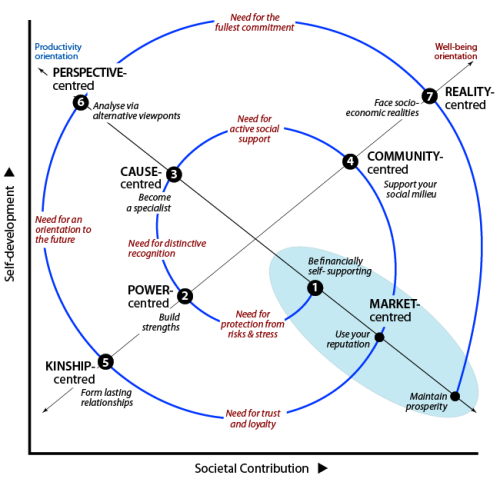Preview: Ensuring Financial Security
The Foundation
Being part of society and having any chance of getting what you want depends on maintaining prosperity.
The foundation of prospering is being financially self-supporting, usually by «making a good living» or earning well so that you can maintain a satisfying standard of living. Above all, you must not be a burden on your family, your community or the government.
Those lowest in status lack economic resources and suffer extreme poverty or homelessness. Low status typically accrues to those in stigmatized groups who struggle to prosper: drug addicts, alcoholics, criminals, illegal immigrants, stateless persons, prisoners, the severely mentally ill—and, almost by definition, the long-term unemployed.
It is possible to be financially independent without earning: for example if wealth is inherited or if there is direct government subsidy for some social reason. However, even in these cases, the natural commencement for obtaining status is in the competition-driven because this is the only mentality that focuses on the importance of money.
Financial strength cannot be taken for granted. The only way to become financially secure and maintain your status even in hard times is:
1: Through developing a good reputation, because that ensures your qualities, skills and knowledge will be regularly sought after by others; and
2: Through avoiding complacency by deliberately preparing for future eventualities that may be unfavourable or bring new challenges to your economic well-being.
Progressing the Cycles

The , having been plotted in a TET, are viewed as . Each mode consists of a distinctive set of maxims for progressively and appropriately . They provide guidelines for handling oneself and others in social life.
As usual, the spiral trajectory is a strenuous process in which each mode becomes a Stage of development. Progress through these Stages builds status by cumulating mode values, but this process can stop at any Stage if prosperity is judged sufficiently secure.
Prosperity is grounded in , which calls for upholding market-centred values: so this is mode-1 and Stage-1.
Drivers
The drivers for evolutionary progression around the Spiral include:
- external competitive pressures
- personal ambitions for social advancement
- personal aspirations for wealth
- external pressures (e.g. from family)
- emergence of obstacles and set-backs
- limitations of the current mode of personal effort
Cycle-1
In Cycle-1, you seek to move beyond immediate financial sufficiency to becoming socially secure through winning esteem and developing a good reputation. ![]() Detail
Detail
By the end of Cycle-1, your plays a big part in sustaining and enhancing your standing and earning capacity, which is why it must be carefully protected.
Cycle-2
In Cycle-2, you seek to insure your position in the face of emerging challenges and strokes of fate by preparing for future eventualities.![]() Detail
Detail
By the end of Cycle-2, your capacity to handle eventualities will be greatly bolstered making you well-positioned to .
Now investigate the growth trajectory in detail:
- Remind yourself of the taxonomic path to this framework.
-
Start with the foundation of status and Cycle-1.
Originally posted: 1-July-2025.